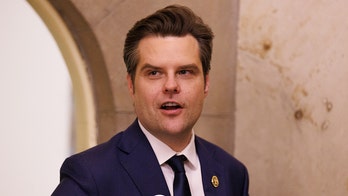One of the primary planks of Mitt Romney's energy plan is re-igniting a decades-old debate in the West about who should control access to fossil fuels on federal lands.
In a campaign speech in Hobbs, N.M., a few weeks ago, the GOP presidential nominee told the crowd, "I will set a national goal of North American independence by 2020. That means we produce all the energy we use in North America."
In addition to opening up new areas for offshore drilling, Romney says his energy independence goal can be accomplished by speeding up the time it takes to get permits to drill on federal lands. The way to do that, he says, is by putting state regulators in charge of the federal process just as they already are on state and private lands.
"On federal lands the permitting process to actually get anything done is extraordinarily slow. In North Dakota, it takes 10 days to get a permit for a new well. In Colorado, it takes 27 days. But do you know how long it takes the federal regulators to get you a permit to get on government land? On average, 307 days."
The energy industry quickly applauded idea of taking the permitting process out of federal hands.
"It makes sense to have wildlife biologists, people that are air and water experts that live and work around the land where it's going to be produced to be the ones that are making those decisions as opposed to some unaccountable government bureaucrat back in Washington, D.C.," said Tim Wigley, president of the nonprofit Western Energy Alliance.
But environmental groups and others were just as quick to attack the idea.
Pete Maysmith, executive director of Colorado Conservation Voters said: "Governor Romney's energy proposal ... ignores the facts and is a giveaway to his big oil campaign supporters at the expense of our air, land and water. Energy production in the United States is at a 20-year high. So the problem is not regulations, the problem is not lack of access to federal lands."
The issue is not a small one in the American West, where most of the nation's public land exists. In many states in the region, 25-75 percent of the land is administered by federal agencies like Bureau of Land Management, the Forest Service, the National Park Service and others.
"It was Teddy Roosevelt," Maysmith said, "a hundred plus years ago that realized this is such a treasure, this gorgeous land that we are so lucky to live in and around in America and, of course, especially in the western U.S. By turning oversight over to the state agencies ... the protections that make sure that our air is not polluted and our waters are not fouled, those are going to run roughshod over."
Ironically, Wigley cites the same past president in supporting the proposed change.
"Especially with former President Theodore Roosevelt. The concept behind it was multiple use of public lands," Wigley said. "It's not an either/or question. You can protect resources, air water, wildlife habitat and so forth and still produce energy." With modern technology, he added, "The amount of impact we're talking about on federal lands is a postage stamp on the United States. It's very, very, very little impact."
Of more immediate concern in political circles will be the impact of Romney's proposal on the way western voters cast their ballots in November, especially those highly coveted independent swing voters in the battleground states of Colorado, Nevada and New Mexico.





